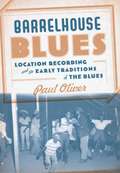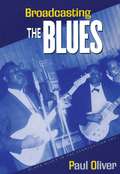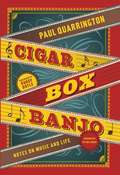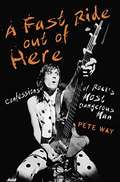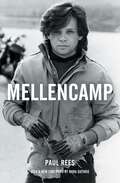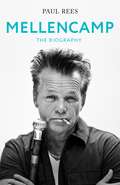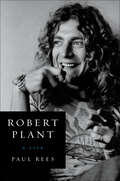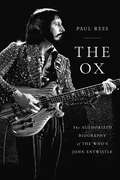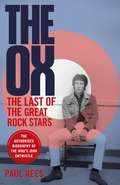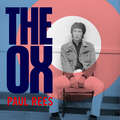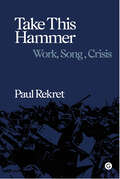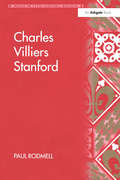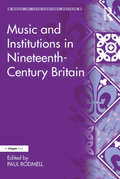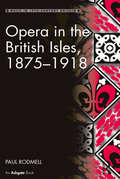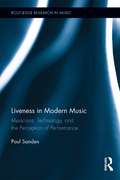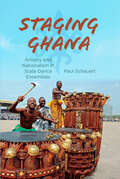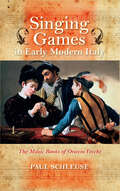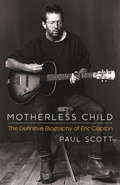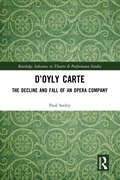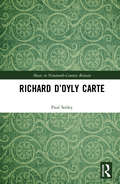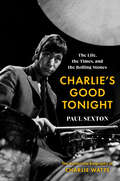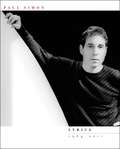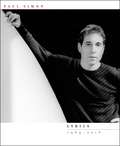- Table View
- List View
Barrelhouse Blues: Location Recording and the Early Traditions of the Blues
by Paul OliverIn the 1920s, Southern record companies ventured to cities like Dallas, Atlanta, and New Orleans, where they set up primitive recording equipment in makeshift studios. They brought in street singers, medicine show performers, pianists from the juke joints and barrelhouses. The music that circulated through Southern work camps, prison farms, and vaudeville shows would be lost to us if it hadn't been captured on location by these performers and recorders.Eminent blues historian Paul Oliver uncovers these folk traditions and the circumstances under which they were recorded, rescuing the forefathers of the blues who were lost before they even had a chance to be heard. A careful excavation of the earliest recordings of the blues by one of its foremost experts, Barrelhouse Blues expands our definition of that most American style of music.
Broadcasting the Blues: Black Blues in the Segregation Era
by Paul OliverBroadcasting the Blues: Black Blues in the Segregation Era is based on Paul Oliver's award-winning radio broadcasts from the BBC that were created over several decades. It traces the social history of the blues in America, from its birth in the rural South through the heyday of sound recordings. Noted blues scholar Paul Oliver draws on decades of research and personal interviews with performers--some of whom he "discovered" and recorded for the first time--to draw a picture of how the blues aesthetic developed, giving new insights into the role blues played in American society before racial integration. The book begins by outlining the history of the blues from African music through country stomps, ragtime songs, and field hollers. From the heroic figures of black folksong--including the steel-driving railroad worker John Henry and the destructive Boll Weevil--to the content of the emerging blues, the author discusses the "meaning" behind the often coded words of the blues, evoking topics such as playful sexuality, magic and medicine, the stresses of segregation, and commentary on national events. Finally, the author traces the history of blues documentation, showing how our views of the early blues have been shaped through a complex interplay of social forces, and indicating possible lines for future research.
Cigar Box Banjo
by Roddy Doyle Paul QuarringtonThis eclectic, funny, and moving book tracks a life lived in music and words. Paul Quarrington ruminates on the bands of his childhood; his restless youth, spent playing bass with the cult band Joe Hall and the Continental Drift; and his incarnation, in middle age, as rhythm guitarist and singer with the band Porkbelly Futures.Ranging through rock 'n' roll, the blues, folk, country and soul, he explores how songs are made, how they work, and why they affect us so deeply. This is also a book about friendship. In his imitably entertaining way, Quarrington recounts the adventures and vicissitudes he and his fellow band members share as they cope with everything from broken strings to broken marriages, making a last stab at that elusive thing called success.
A Fast Ride Out of Here: Confessions of Rock's Most Dangerous Man
by Paul Rees Pete Way'They call me a madman but compared to Pete Way, I'm out of my league.' - Ozzy OsbourneThere are rock memoirs and then there is this one. A Fast Ride Out of Here tells a story that is so shocking, so outrageous, so packed with excess and leading to such uproar and tragic consequences as to be almost beyond compare. Put simply, in terms of jaw-dropping incident, self-destruction and all-round craziness, Pete Way's rock'n'roll life makes even Keith Richards's appear routine and Ozzy Osbourne seem positively mild-mannered in comparison. Not for nothing did Nikki Sixx, bassist with LA shock-rockers Motley Crue and who 'died' for eight minutes following a heroin overdose in 1988, consider that he was a disciple of and apprenticed to Way.During a forty-year career as founding member and bassist of the venerated British hard rock band UFO, and which has also included a stint in his hell-raising buddy Ozzy's band, Pete Way has both scaled giddy heights and plunged to unfathomable lows. A heroin addict for more than ten years, he blew millions on drugs and booze and left behind him a trail of chaos and carnage. The human cost of this runs to six marriages, four divorces, a pair of estranged daughters and two dead ex-wives. Latterly, Way has fought cancer, but has survived it all and is now ready to tell his extraordinary tale. By turns hilarious, heart-rending, mordant, scabrous, self-lacerating, brutally honest and entirely compulsive, A Fast Ride Out of Here will be a monument to rock'n'roll debauchery on an epic, unparalleled scale and also to one man's sheer indestructability.
A Fast Ride Out of Here: Confessions of Rock's Most Dangerous Man
by Paul Rees Pete Way'They call me a madman but compared to Pete Way, I'm out of my league.' - Ozzy OsbourneThere are rock memoirs and then there is this one. A Fast Ride Out of Here tells a story that is so shocking, so outrageous, so packed with excess and leading to such uproar and tragic consequences as to be almost beyond compare. Put simply, in terms of jaw-dropping incident, self-destruction and all-round craziness, Pete Way's rock'n'roll life makes even Keith Richards's appear routine and Ozzy Osbourne seem positively mild-mannered in comparison. Not for nothing did Nikki Sixx, bassist with LA shock-rockers Motley Crue and who 'died' for eight minutes following a heroin overdose in 1988, consider that he was a disciple of and apprenticed to Way.During a forty-year career as founding member and bassist of the venerated British hard rock band UFO, and which has also included a stint in his hell-raising buddy Ozzy's band, Pete Way has both scaled giddy heights and plunged to unfathomable lows. A heroin addict for more than ten years, he blew millions on drugs and booze and left behind him a trail of chaos and carnage. The human cost of this runs to six marriages, four divorces, a pair of estranged daughters and two dead ex-wives. Latterly, Way has fought cancer, but has survived it all and is now ready to tell his extraordinary tale. By turns hilarious, heart-rending, mordant, scabrous, self-lacerating, brutally honest and entirely compulsive, A Fast Ride Out of Here will be a monument to rock'n'roll debauchery on an epic, unparalleled scale and also to one man's sheer indestructability.
Mellencamp
by Paul ReesThe definitive biography of John Mellencamp, the iconic American rock and roll original, featuring exclusive in-depth interviews and never-before-told details. Perfect for fans of Janis and Born to Run.John Mellencamp is not your typical rock star. With music inspired by the work of William Faulkner, John Steinbeck, and other giants of American literature, he has experienced a colorful career unlike any other. Now, this fascinating biography fully charts the life of one of this country&’s most important voices in American music. Mellencamp&’s story is also the story of the American heartland. His coming of age as an artist and evolution into legendary status directly reflected the major changes of the last fifty years. From the Summer of Love to the growing divisiveness of American politics and beyond, his music has served as the backdrop to this evolving country for millions of fans. Featuring exclusive interviews with friends, family, and colleagues, and exploring everything from the founding of Farm Aid to his induction into the Rock and Roll Hall of Fame, this is a fresh and expansive look at a true original.
Mellencamp: The Biography
by Paul ReesThe definitive biography of John Mellencamp featuring exclusive interviews and never-before-told details about the life of the iconic American rock and roll original.John Mellencamp is not your typical rock star.With music inspired by the work of William Faulkner, John Steinbeck, and other giants of American literature, Mellencamp is a complex, colorful and larger than life character who walks to the beat of his own drum. Or, as he told author and veteran music journalist, Paul Rees: 'I just refuse to take shit off anyone'. Now, this fascinating biography fully charts the life of one of this country's most important voices in American music.Mellencamp's story is also the story of the American heartland. His coming of age as an artist and evolution into legendary status directly reflected the major changes of the last fifty years. From the Summer of Love to the growing divisiveness of American politics and beyond, his music has served as the backdrop of this evolving country for millions of fans.For the first time, this story written with the cooperation and support of Mellencamp and his management will include extensive interviews with members of Mellencamp's family, many of his bandmates and collaborators, past and present, and Mellencamp himself. Together, they shed new light on a man hailed by none other than Johnny Cash as 'among our greatest living songwriters'. An exploration of everything from the founding of Farm Aid to his induction into the Rock and Roll Hall of Fame, this is a fresh and expansive look at a true original.
Robert Plant: A Life
by Paul ReesThis biography of the solo artist and legendary lead singer of Led Zeppelin “informs and entertains . . . leav[ing] few stones in Plant’s life unturned.” —Mojo magazineRobert Plant by Paul Rees is the definitive biography of Led Zeppelin's legendary frontman. As lead singer for one of the biggest and most influential rock bands of all time—whose song “Stairway to Heaven” has been played more times on American radio than any other track—Robert Plant defined what it means to be a rock god.Over the course of his twenty-year career, British music journalist and editor Paul Rees has interviewed such greats as Sir Paul McCartney, Bruce Springsteen, Madonna, Bono, and AC/DC. Rees now offers a full portrait of Robert Plant for the first time, exploring the forces that shaped him, the ravaging highs and lows of the Zeppelin years—including his relationship with Jimmy Page and John Bonham—and his life as a solo artist today.Illustrated with more than two dozen photographs, Robert Plant: A LIfe is the never-before-told story of a gifted, complicated music icon who changed the face of rock 'n' roll.“Anyone seeking insight into Robert Plant as a man and musician will find it here.” —Q Magazine“Particularly enlightening on Plant’s formative pre-Zep years in the Midlands, A Life puts the singer’s eclectic career into clear context.” —Dave Lewis, Tight But Loose magazine
The Ox: The Authorized Biography of The Who's John Entwistle
by Paul ReesThe definitive, no-holds-barred biography of John Entwistle, The Who's legendary bass guitaristIt is an unequivocal fact that in terms of rock bands, the Beatles, the Rolling Stones and the Who represent Year Zero; the beginning of all things, ground-breakers all. To that incontrovertible end, John Entwistle-the Who's beloved bassist-remains an enigmatic yet undeniably influential figure, renowned as much for his immense talent as for his gloriously oversized-seeming character. However, unlike his fellow musicians, Entwistle has yet to be the subject of a major biography. In the years since his death, his enduring legacy has been carefully guarded by his loved ones, preventing potential biographers from gaining close enough access to write a definitive account of his extraordinary life-until now. For the first time, and with the full co-operation of the Entwistle family, The Ox shines a long overdue light on one of the most important figures in rock history. Drawing on his own notes for an unfinished autobiography that he started before his death in 2002, as well as his personal archives and interviews with his family and friends, The Ox gives readers a never-before-seen glimpse into the two very distinct poles of John Entwistle. On the one hand, he was the rock star incarnate-larger than life, self-obsessed to a fault, and proudly and almost defiantly so. Extravagant with money, he famously shipped vintage American cars across the Atlantic without having so much as a driver's license, built exponentially bigger and grandiose bars into every home he owned, and amassed an extraordinary collection of possessions, from armor and weaponry to his patented Cuban-heel boots. But beneath this fame and flutter, he was also a man of simple tastes and traditional opinions. He was a devoted father and family man who loved nothing more than to wake up to a full English breakfast, or to have a supper of fish, chips, and a pint at his local pub. After his untimely death, many of these stories were shuttered away into the memories of his family and friends. At long last, The Ox introduces us to the man behind the myth-the iconic and inimitable John Entwistle.
The Ox: The Last of the Great Rock Stars: The Authorised Biography of The Who's John Entwistle
by Paul ReesThe definitive no-holds-barred biography of John Entwistle, The Who's legendary bass guitaristIt is an unequivocal fact that in terms of rock bands, the Beatles, the Rolling Stones and the Who represent Year Zero; the beginning of all things, ground-breakers all. To that end, John Entwistle - the Who's beloved bassist - is also without question one of the most important and influential figures in the annals of rock. He is also among an even more rarefied few by virtue of his being such a fascinating, transfixing and gloriously oversized character. However, Entwistle has not been the subject of a major biography. Likely, this was due to no-one being able to gain close access to the subject himself: the still in many other respects enigmatic Entwistle's enduring legacy has been carefully guarded by his surviving family. With the full co-operation of the Entwistle family, The Ox will correct this oversight and in doing so, shine a long overdue light on one of the single greatest, and most impactful figures in rock history.Drawing on his own notes for an unfinished autobiography that he started before his death in 2002 (and which will be quoted from extensively), as well as his personal archives and interviews with his family and friends, The Ox will give readers a never-before-seen glimpse into the two very distinct poles of John Entwistle. On the one hand, he was the rock star incarnate, being larger than life, self-obsessed to a fault, and proudly and almost defiantly so. Extravagant with money, he famously shipped two vintage American cars across the Atlantic without having so much as a driver's license, built exponentially bigger and grandiose bars into every home he owned, and amassed an extraordinary collection of possessions, from arachnids, armor, and weaponry, to his patented Cuban-heeled boots. But beneath this fame and flutter, he was also a man of simple tastes and traditional opinions. He was a devoted father and family man who loved nothing more than to wake up to a full English breakfast, or to have a supper of fish, chips, and a pint at his local pub.After his untimely death, many of these stories were shuttered away into the memories of his family, friends, and loved ones, but now, for the first time, The Ox will introduce us to the man behind the myth-the iconic and inimitable John Entwistle.
The Ox: The Last of the Great Rock Stars: The Authorised Biography of The Who's John Entwistle
by Paul Rees'A highly entertaining read' The Times Music Books of the Year'Eye-popping' The Times best summer booksThe definitive no-holds-barred biography of John Entwistle, The Who's legendary bass guitaristIt is an unequivocal fact that in terms of rock bands, the Beatles, the Rolling Stones and the Who represent Year Zero; the beginning of all things, ground-breakers all. To that end, John Entwistle - the Who's beloved bassist - is also without question one of the most important and influential figures in the annals of rock. He is also among an even more rarefied few by virtue of his being such a fascinating, transfixing and gloriously oversized character. However, Entwistle has not been the subject of a major biography. Likely, this was due to no-one being able to gain close access to the subject himself: the still in many other respects enigmatic Entwistle's enduring legacy has been carefully guarded by his surviving family. With the full co-operation of the Entwistle family, The Ox will correct this oversight and in doing so, shine a long overdue light on one of the single greatest, and most impactful figures in rock history.Drawing on his own notes for an unfinished autobiography that he started before his death in 2002 (and which will be quoted from extensively), as well as his personal archives and interviews with his family and friends, The Ox will give readers a never-before-seen glimpse into the two very distinct poles of John Entwistle. On the one hand, he was the rock star incarnate, being larger than life, self-obsessed to a fault, and proudly and almost defiantly so. Extravagant with money, he famously shipped two vintage American cars across the Atlantic without having so much as a driver's license, built exponentially bigger and grandiose bars into every home he owned, and amassed an extraordinary collection of possessions, from arachnids, armor, and weaponry, to his Cuban-heeled boots. But beneath this fame and flutter, he was also a man of simple tastes and traditional opinions. He was a devoted father and family man who loved nothing more than to wake up to a full English breakfast, or to have a supper of fish, chips, and a pint at his local pub.After his untimely death, many of these stories were shuttered away into the memories of his family, friends, and loved ones, but now, for the first time, The Ox will introduce us to the man behind the myth-the iconic and inimitable John Entwistle.
Down with Childhood: Pop Music and the Crisis of Innocence
by Paul RekretSometimes popular music registers our concerns and anxieties more lucidly than we realise. This is evident in the case of an ideal of childhood innocence in rapid decay in recent decades.So claims Down with Childhood, as it takes in psychedelia’s preoccupation with rebirth and inner-children, the fascination with juvenilia amidst an ebbing UK rave scene and dozens of nursery rhyme hip-hop choruses spawned by a hit Jay-Z tune.As it examines the often complex sets of meanings to which the occasional presence of children in pop songs attests, the book pauses at Musical Youth’s ‘Pass the Dutchie’ and other one-hit teen wonders, the career paths of child stars including Michael Jackson and Britney Spears, radical experiments in free jazz, and Black Panther influenced children’s soul groups.In the process, a novel argument begins to emerge relating the often remarked crisis of childhood to changing experiences of work and play and ultimately, to an ongoing capitalist crisis that underlies them.
Take This Hammer: Work, Song, Crisis (Goldsmiths Press / Sonics Series)
by Paul RekretA study of contemporary music in light of transformations to work and social life.The emergence of the popular music industry in the early twentieth century not only drove a wedge between music production and consumption, it also underscored a wider separation of labor from leisure and of the workplace from the domestic sphere. These were changes characteristic of an industrial society where pleasure was to be sought outside of work, but these categories have grown increasingly porous today. As the working day extends into the home or becomes indistinguishable from leisure time, so the role and meaning of music in everyday life changes too. In arguing that the experience of popular music is partly conditioned by its segregation from work and its restriction to the time and space of leisure—the evening, the weekend, the dancehall—Take This Hammer shows how changes to work as it grows increasingly precarious, part-time, and temporary in recent decades, are related to transformations in popular music. Connecting contemporary changes in work and the economy to tendencies in popular music, Take This Hammer shows how song-form has both reflected developments in contemporary capitalism while also intimating a horizon beyond it. From online streaming and the extension of the working day to gentrification, unemployment and the emergence of trap rap, from ecological crisis and field recording to automation and trends in dance music, by exploring the intersections of work and song in the current era, not only do we gain a new understanding of contemporary musical culture, we also see how music might gesture towards a horizon beyond the alienating experience of work in capitalism itself.
Charles Villiers Stanford (Music In Nineteenth-century Britain Ser.)
by Paul RodmellThe first book devoted to the composer Charles Villiers Stanford (1852-1924) since 1935, this survey provides the fullest account of his life and the most detailed appraisal of his music to date. Renowned in his own lifetime for the rapid rate at which he produced new works, Stanford was also an important conductor and teacher. Paul Rodmell assesses these different roles and considers what Stanford's legacy to British music has been. Born and brought up in Dublin, Stanford studied at Cambridge and was later appointed Professor of Music there. His Irish lineage remained significant to him throughout his life, and this little-studied aspect of his character is examined here in detail for the first time. A man about whom no-one who met him could feel indifferent, Stanford made friends and enemies in equal numbers. Rodmell charts these relationships with people and institutions such as Richter, Parry and the Royal College of Music, and discusses how they influenced Stanford's career. Perhaps not the most popular of teachers, Stanford nevertheless coached a generation of composers who were to revitalize British music, amongst them Coleridge-Taylor, Ireland, Vaughan-Williams, Holst, Bridge and Howells. While their musical styles may not be obviously indebted to Stanford's, it is clear that, without him, British music of the first half of the twentieth century might have taken a very different course.
Music and Institutions in Nineteenth-Century Britain (Music in Nineteenth-Century Britain)
by Paul RodmellIn nineteenth-century British society music and musicians were organized as they had never been before. This organization was manifested, in part, by the introduction of music into powerful institutions, both out of belief in music's inherently beneficial properties, and also to promote music occupations and professions in society at large. This book provides a representative and varied sample of the interactions between music and organizations in various locations in the nineteenth-century British Empire, exploring not only how and why music was institutionalized, but also how and why institutions became 'musicalized'. Individual essays explore amateur societies that promoted music-making; institutions that played host to music-making groups, both amateur and professional; music in diverse educational institutions; and the relationships between music and what might be referred to as the 'institutions of state'. Through all of the essays runs the theme of the various ways in which institutions of varying formality and rigidity interacted with music and musicians, and the mutual benefit and exploitation that resulted from that interaction.
Opera in the British Isles, 1875-1918 (Music in Nineteenth-Century Britain)
by Paul RodmellWhile the musical culture of the British Isles in the 'long nineteenth century' has been reclaimed from obscurity by musicologists in the last thirty years, appraisal of operatic culture in the latter part of this period has remained largely elusive. Paul Rodmell argues that there were far more opportunities for composers, performers and audiences than one might expect, an assertion demonstrated by the fact that over one hundred serious operas by British composers were premiered between 1875 and 1918. Rodmell examines the nature of operatic culture in the British Isles during this period, looking at the way in which opera was produced and 'consumed' by companies and audiences, the repertory performed, social attitudes to opera, the dominance of London's West End and the activities of touring companies in the provinces, and the position of British composers within this realm of activity. In doing so, he uncovers the undoubted challenges faced by opera in Britain in this period, and delves further into why it was especially difficult to make a breakthrough in this particular genre when other fields of compositional endeavour were enjoying a period of sustained growth. Whilst contemporaneous composers and commentators and later advocates of British music may have felt that the country's operatic life did not measure up to their aspirations or ambitions, there was still a great deal of activity and, even if this was not necessarily that which was always desired, it had a significant and lasting impact on musical culture in Britain.
Liveness in Modern Music: Musicians, Technology, and the Perception of Performance (Routledge Research in Music)
by Paul SandenThis study investigates the idea and practice of liveness in modern music. Understanding what makes music live in an ever-changing musical and technological terrain is one of the more complex and timely challenges facing scholars of current music, where liveness is typically understood to represent performance and to stand in opposition to recording, amplification, and other methods of electronically mediating music. The book argues that liveness itself emerges from dynamic tensions inherent in mediated musical contexts—tensions between music as an acoustic human utterance, and musical sound as something produced or altered by machines. Sanden analyzes liveness in mediatized music (music for which electronic mediation plays an intrinsically defining role), exploring the role this concept plays in defining musical meaning. In discussions of music from both popular and classical traditions, Sanden demonstrates how liveness is performed by acts of human expression in productive tension with the electronic machines involved in making this music, whether on stage or on recording. Liveness is not a fixed ontological state that exists in the absence of electronic mediation, but rather a dynamically performed assertion of human presence within a technological network of communication. This book provides new insights into how the ideas of performance and liveness continue to permeate the perception and reception of even highly mediatized music within a society so deeply invested, on every level, with the use of electronic technologies.
Staging Ghana: Artistry And Nationalism In State Dance Ensembles (Ethnomusicology Multimedia)
by Paul SchauertThe Ghana Dance Ensemble takes Ghana's national culture and interprets it in performance using authentic dance forms adapted for local or foreign audiences. Often, says Paul Schauert, the aims of the ensemble and the aims of the individual performers work in opposition. Schauert discusses the history of the dance troupe and its role in Ghana's post-independence nation-building strategy and illustrates how the nation's culture makes its way onto the stage. He argues that as dancers negotiate the terrain of what is or is not authentic, they also find ways to express their personal aspirations, discovering, within the framework of nationalism or collective identity, that there is considerable room to reform national ideals through individual virtuosity.
Singing Games in Early Modern Italy: The Music Books Of Orazio Vecchi (Music And The Early Modern Imagination Ser.)
by Paul SchleuseIn Italy during the late cinquecento, printed music could be found not only in the homes of the wealthy or the music professional, but also in lay homes, courts, and academies. No longer confined to the salons of the elite, music took on the role of social play and recreation. Paul Schleuse examines these new musical forms through a study of the music books of Italian priest, poet, and composer, Orazio Vecchi. Composed for minor patrons and the wider music-buying public, Vecchi's madrigals took as their subjects game-playing, drinking, hunting, battles, and the life of the street. Schleuse looks at how music and game-playing allowed singers and performers to play the roles of exemplary pastoral characters and also comic, foreign, and "rustic" others in ways that defined and ultimately reinforced social norms of the times. His findings reposition Orazio Vecchi as one of the most innovative composers of the late 16th century.
Motherless Child: The Definitive Biography of Eric Clapton
by Paul ScottFrom the Yardbirds to Cream, Blind Faith to Derek and the Dominos, and a hugely-successful solo career, Eric Clapton's fifty years in the music business can look like an uninterrupted rise to become one of the greatest guitar players who ever lived. But his story is as complicated as it is fascinating.Clapton's god-like skill with a guitar was matched by an almost equal talent for self-destruction. He has never shied away from telling the truth about his battles with drink and drugs - or the sometimes catastrophic impact they had on the other people in his life, including his first wife Pattie Boyd. And without those deep personal lows we may never have had the musical highs that won him millions of fans. His story is also one of a long but successful road to sobriety, redemption and happiness.Motherless Child chronicles Clapton's remarkable journey: the music, the women, the drugs, the cars, the guitars, the heartbreak and the triumphs are all here. The book includes interviews with some people close to Clapton who have never spoken on the record before. It explores his musical legacy as one of the most influential musicians of his generation, and as the keeper of the flame for the blues.
D’Oyly Carte: The Decline and Fall of an Opera Company (Routledge Advances in Theatre & Performance Studies)
by Paul SeeleyThis book considers and discusses aspects of the management of the D’Oyly Carte Opera Company in the twentieth century since the death of its founder Richard D’Oyly Carte, and concentrates on key events that contributed to its demise in 1982. In this book, Paul Seeley follows the analytical model that proposes no single factor triggered the collapse, but rather several, both external and internal. In the case of an opera company the external factors may include public taste and market forces, but more significant are the internal factors such as the management decisions taken in response to external factors and how these compare with the original artistic aims, aspirations and business models of the founder. This is a study by someone with close observation of the administration; at the 1982 demise, Seeley was assistant to the company manager, having earlier served on the music staff. The book is a must-read for music historians, theatre historians and arts-management professionals; as an uncompromisingly critical history of the D'Oyly Carte Opera Company it is designed to serve a wider public, not just the Gilbert and Sullivan opera specialist, but anyone keen to debate the desirability of private or public sponsorship of the performing arts.
Richard D’Oyly Carte (Music in Nineteenth-Century Britain)
by Paul SeeleyThe first biography of Richard D’Oyly Carte, this is a critical survey of the career of the impresario whose ambitions went beyond the famous partnership of Gilbert and Sullivan. Errors and misconceptions in current literature are challenged and corrected to give a truer portrayal of one of the most influential music theatre promoters in the nineteenth century.
Charlie's Good Tonight: The Life, the Times, and the Rolling Stones: The Authorized Biography of Charlie Watts
by Paul SextonThe fully authorized and official biography of legendary Rolling Stones drummer Charlie Watts, one of the world’s most revered and celebrated musicians of the last half century.Forewords by Mick Jagger and Keith Richards.Charlie Watts was one of the most decorated musicians in the world, having joined the Rolling Stones, a few months after their formation, early in 1963.A student of jazz drumming, he was headhunted by the band after bumping into them regularly in London’s rhythm and blues clubs. Once installed at the drum seat, he didn’t miss a gig, album or tour in his 60 years in the band. He was there throughout the swinging sixties, the early shot at superstardom and the Stones' world conquest; and throughout the debauchery of the 1970s, typified by 1972's Exile on Main St., considered one of the great albums of the century. By the 1980s, Charlie was battling his own demons, but emerged unscathed to enhance his unparalleled reputation even further over the ensuing decades.Watts went through band bust-ups, bereavements and changes in personnel, managers, guitarists and rhythm sections, but remained the rock at the heart of the Rolling Stones for nearly 60 years—the thoughtful, intellectual but no less compelling counterpoint to the raucousness of his bandmates Keith Richards, Mick Jagger and Ronnie Wood. And this is his story.
Lyrics 1964-2008
by Paul SimonA landmark compilation of popular music, this collection contains Paul Simon's lyrics from his first album in 1964 to the present.
Lyrics 1964-2016
by Paul SimonA landmark compilation of popular music, this collection contains Paul Simon's lyrics from his first album in 1964 to the present.
